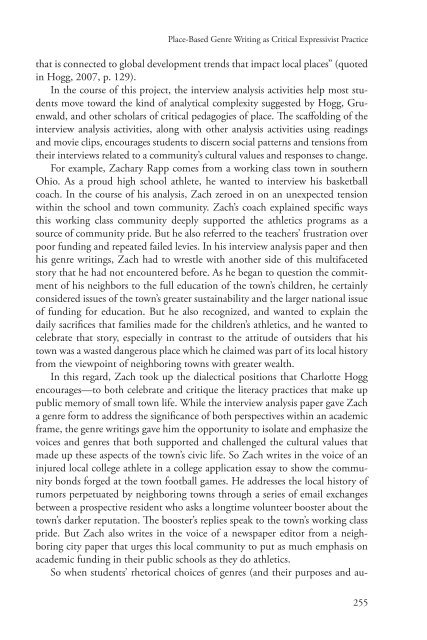Critical Expressivism- Theory and Practice in the Composition Classroom, 2014a
Critical Expressivism- Theory and Practice in the Composition Classroom, 2014a
Critical Expressivism- Theory and Practice in the Composition Classroom, 2014a
You also want an ePaper? Increase the reach of your titles
YUMPU automatically turns print PDFs into web optimized ePapers that Google loves.
Place-Based Genre Writ<strong>in</strong>g as <strong>Critical</strong> Expressivist <strong>Practice</strong><br />
that is connected to global development trends that impact local places” (quoted<br />
<strong>in</strong> Hogg, 2007, p. 129).<br />
In <strong>the</strong> course of this project, <strong>the</strong> <strong>in</strong>terview analysis activities help most students<br />
move toward <strong>the</strong> k<strong>in</strong>d of analytical complexity suggested by Hogg, Gruenwald,<br />
<strong>and</strong> o<strong>the</strong>r scholars of critical pedagogies of place. The scaffold<strong>in</strong>g of <strong>the</strong><br />
<strong>in</strong>terview analysis activities, along with o<strong>the</strong>r analysis activities us<strong>in</strong>g read<strong>in</strong>gs<br />
<strong>and</strong> movie clips, encourages students to discern social patterns <strong>and</strong> tensions from<br />
<strong>the</strong>ir <strong>in</strong>terviews related to a community’s cultural values <strong>and</strong> responses to change.<br />
For example, Zachary Rapp comes from a work<strong>in</strong>g class town <strong>in</strong> sou<strong>the</strong>rn<br />
Ohio. As a proud high school athlete, he wanted to <strong>in</strong>terview his basketball<br />
coach. In <strong>the</strong> course of his analysis, Zach zeroed <strong>in</strong> on an unexpected tension<br />
with<strong>in</strong> <strong>the</strong> school <strong>and</strong> town community. Zach’s coach expla<strong>in</strong>ed specific ways<br />
this work<strong>in</strong>g class community deeply supported <strong>the</strong> athletics programs as a<br />
source of community pride. But he also referred to <strong>the</strong> teachers’ frustration over<br />
poor fund<strong>in</strong>g <strong>and</strong> repeated failed levies. In his <strong>in</strong>terview analysis paper <strong>and</strong> <strong>the</strong>n<br />
his genre writ<strong>in</strong>gs, Zach had to wrestle with ano<strong>the</strong>r side of this multifaceted<br />
story that he had not encountered before. As he began to question <strong>the</strong> commitment<br />
of his neighbors to <strong>the</strong> full education of <strong>the</strong> town’s children, he certa<strong>in</strong>ly<br />
considered issues of <strong>the</strong> town’s greater susta<strong>in</strong>ability <strong>and</strong> <strong>the</strong> larger national issue<br />
of fund<strong>in</strong>g for education. But he also recognized, <strong>and</strong> wanted to expla<strong>in</strong> <strong>the</strong><br />
daily sacrifices that families made for <strong>the</strong> children’s athletics, <strong>and</strong> he wanted to<br />
celebrate that story, especially <strong>in</strong> contrast to <strong>the</strong> attitude of outsiders that his<br />
town was a wasted dangerous place which he claimed was part of its local history<br />
from <strong>the</strong> viewpo<strong>in</strong>t of neighbor<strong>in</strong>g towns with greater wealth.<br />
In this regard, Zach took up <strong>the</strong> dialectical positions that Charlotte Hogg<br />
encourages—to both celebrate <strong>and</strong> critique <strong>the</strong> literacy practices that make up<br />
public memory of small town life. While <strong>the</strong> <strong>in</strong>terview analysis paper gave Zach<br />
a genre form to address <strong>the</strong> significance of both perspectives with<strong>in</strong> an academic<br />
frame, <strong>the</strong> genre writ<strong>in</strong>gs gave him <strong>the</strong> opportunity to isolate <strong>and</strong> emphasize <strong>the</strong><br />
voices <strong>and</strong> genres that both supported <strong>and</strong> challenged <strong>the</strong> cultural values that<br />
made up <strong>the</strong>se aspects of <strong>the</strong> town’s civic life. So Zach writes <strong>in</strong> <strong>the</strong> voice of an<br />
<strong>in</strong>jured local college athlete <strong>in</strong> a college application essay to show <strong>the</strong> community<br />
bonds forged at <strong>the</strong> town football games. He addresses <strong>the</strong> local history of<br />
rumors perpetuated by neighbor<strong>in</strong>g towns through a series of email exchanges<br />
between a prospective resident who asks a longtime volunteer booster about <strong>the</strong><br />
town’s darker reputation. The booster’s replies speak to <strong>the</strong> town’s work<strong>in</strong>g class<br />
pride. But Zach also writes <strong>in</strong> <strong>the</strong> voice of a newspaper editor from a neighbor<strong>in</strong>g<br />
city paper that urges this local community to put as much emphasis on<br />
academic fund<strong>in</strong>g <strong>in</strong> <strong>the</strong>ir public schools as <strong>the</strong>y do athletics.<br />
So when students’ rhetorical choices of genres (<strong>and</strong> <strong>the</strong>ir purposes <strong>and</strong> au-<br />
255


















